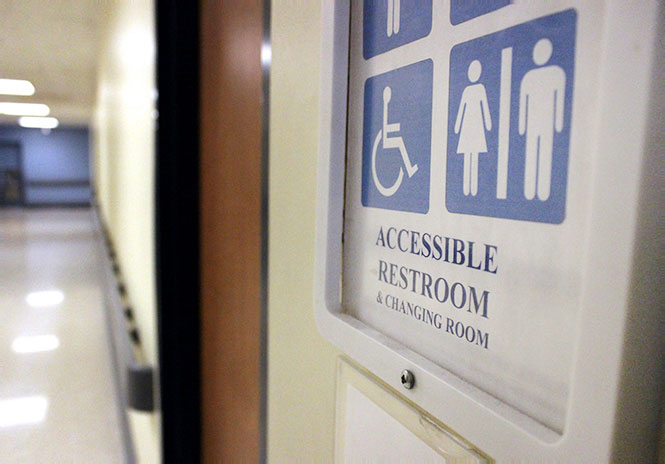Gender-neutral living improves
University policy dictates that students use the restroom to which their gender corresponds — a simple enough concept for the majority of Kent State students who are certain about what that means. But for a fraction of the student population who don’t identify as the gender in which they were born, finding a place to comfortably use the facilities is a daily struggle. For this reason, the university is working to provide services for these students.
“We don’t have a good program for any queer students through the housing program, and there are very few family restrooms on campus,” Kieran Raines, a graduate information architecture and information management student said. Raines identifies as gender-neutral and lives life without traditionally male or female customs.
Other Ohio universities that offer gender-neutral housing/residence bathrooms:
- Ohio State University
- Ohio University
- Oberlin College
- College of Wooster
- University of Toledo
In order for transgendered students to use their preferred restroom, the university requires they have undergone the appropriate surgeries and made the legal adjustments on their state issued ID. Many “traditional” students feel uncomfortable sharing restrooms with a member of the opposite sex; therefore, private family restrooms are the university’s objective solution.
“I think family restrooms are a good idea because I’m not sure how I’d feel about a guy using the women’s restroom with me, even if that’s not how they identify. Everyone should feel comfortable,” said sophomore fashion design major Sarah Linsky. “I’d be OK with the university using funding for that.”
There are 13 official family restrooms on campus, and three more are in the works, including the field house, said Jacqueline Gee, university accessibility liaison for Kent State. Gee’s job includes making sure students feel comfortable during their time at Kent State. She said the ultimate goal is to offer a family restroom on the first floor of every campus building in the spirit of inclusion.
Gee’s working on a collaborative effort between herself and information systems to give students the opportunity to access gender-neutral accommodations online.
“I feel very strongly about that obviously. I don’t want someone to have to call and say ‘I need a private bathroom,’” Gee said. “It works for diabetics, it works for people who need colostomy bags and even if you just need a private moment alone.”
Unisex restrooms are located in the following buildings on the Kent campus:
- Cartwright Hall
- Franklin Hall
- Ice Arena
- Kent Hall
- Kent Center for Performing Arts
- Oscar Ritchie Hall
- Schwartz Center
- Student Center
- Student Recreation and Wellness Center
- Taylor Hall
A number of restrooms are being equipped with showers and modern, green technology to provide a diversity of amenities to students and faculty as well. Each offers automatic sinks, toilets and paper towel dispensers, Gee said. Because each restroom is an original model, it’s difficult to gauge the cost of putting new ones in, she said. For Gee, it is more about making sure all students have access to necessary resources.
Students can also contact residential services and request a dorm unaffiliated with gender.
Gender-neutral housing is limited largely due to the lack of genderless restrooms in campus housing units. Many of the halls wouldn’t be as conducive to gender-neutral housing, but the ones that are often meet demands considering the modest number of students requesting them. These include but are not limited to Korb Hall, all Centennials and Twin Towers, said Jill Church, director of Residence Services.
According to policies published on the university’s website, gender-neutral housing is offered based on availability and willingness of student cooperation in contract renewals. These housing assignments are made on a case-by-case basis. Church said there’s enough student interest to make it a topic of concern in her office.
“We try to work with students so they are comfortable and feel safe in their living assignment,” Church said. “For some students, that’s giving them a living assignment that isn’t based on their sex, but rather on how they identify. We have student pairings that are two females living together, two males living together. So we allow students to talk with us and tell us what they’re most comfortable with, and we’ll make the assignments based on what they want.”
Transgender individuals, or those who are transitioning to transgender status, who are requesting a roommate are encouraged to meet with Residence Services staff (the associate director of Residential Communities at 330-672-2520) and/or the associate director of Residence Services at 330-672-1223 to process this request.
Church said residence services is working on kickstarting a gender-neutral living learning community in style of the Women’s Center. The office is beginning preliminary meetings and brainstorming how this would work.
“This community, if we could get it going, would have a staff member associated with it beyond the hall staff, and we’d do programming and activities for those students,” she said.
Contact Chrissy Suttles at [email protected].



